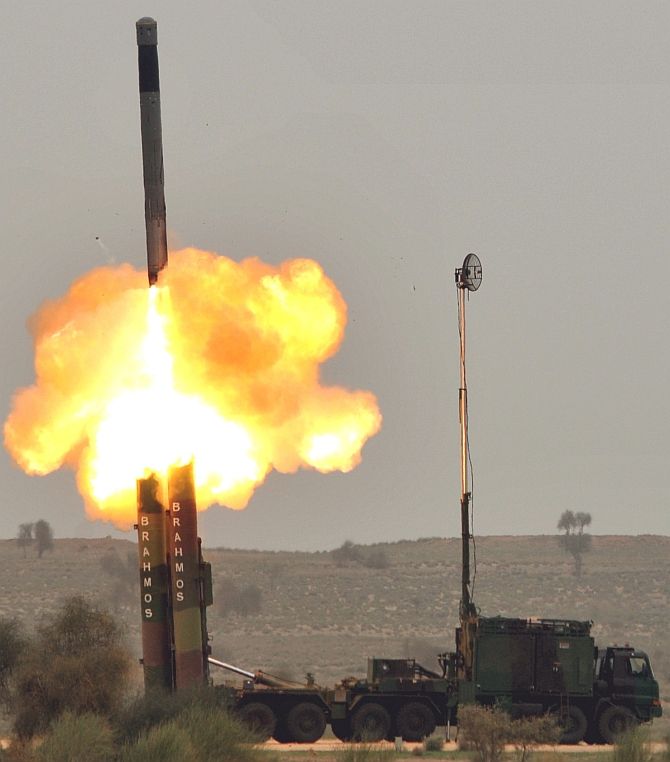Not just Vietnam, but other countries in the region like Philippines, Malaysia and Thailand have also expressed an interest in acquiring the BrahMos cruise missile. Debalina Ghoshal explains the significance of the move.

The range of the BrahMos cruise missile, a joint venture between India and Russia, was restricted to 290 km since Moscow was a member of the Missile Technology Control Regime.
The MTCR does not permit member-States to co-develop missiles with other countries or sell missiles (nuclear-capable) above the range of 300 km and a payload capacity of 500 kg.
When the BrahMos was developed, India had not been granted membership of the MTCR. Thus, the 290km-range cruise missile opened the doors for India to make this missile for export in the future even if it was not granted MTCR membership.
However, in June 2016, India was granted membership to the Missile Technology Control Regime.
The MTCR membership further strengthens India’s legitimacy for the sale of missile technology to other countries.
One of the countries that had for long expressed interest in acquiring the BrahMos cruise missiles was Vietnam.
The possibility of the sale of the BrahMos cruise missiles to Vietnam has drawn attention, as also criticism from China.
Recent reports confirm that India and Vietnam are once again discussing the possibilities of the sale of the BrahMos missiles; both the countries are involved in territorial disputes with China, the former over the Line of Actual Control and the latter in the South China Sea.
India and Vietnam have discussed the possibility of the sale of BrahMos cruise missiles for quite some time now, but India was careful to not annoy China with any strategically destabilising move.
However, China’s ‘string of pearls’ strategy vis-a-vis India in the South Asian region, especially China’s alliance with Pakistan, its efforts to strengthen defence ties with Sri Lanka are all an annoyance for New Delhi. Moreover, India is also concerned about China’s One Belt One Road initiative.
On the other hand, China’s increased assertiveness and muscle-flexing in the South China Sea through increased naval presence, has not been viewed in positive light by many of the South East Asian countries, Vietnam being one.
In January 2015, Vietnam's vice minister of defence, Senior Lt Gen Nguyen Chi Vinh, was quoted saying: “Because of the very drastic change in regional security, it has set the need for a closer cooperation between our two countries -- mostly in terms of strategic partnership.”
Vietnam had realised long back its navy’s weakness of not being able to project its force in the outer areas of the Exclusive Economic Zone and such cooperation will only enable Vietnam to at least contain China.
Vietnam is modernising its defence forces as a result of its territorial disputes with China, and India could be a crucial partner.
In May 2015, India and Vietnam signed the joint vision statement on defence cooperation from 2015-20 to bolster defence ties, including naval cooperation between the two countries.
During his recent visit to Vietnam, Defence Minister Manohar Parrikar met his Vietnamese counterpart Gen Ngo Xuan Lich to strengthen bilateral defence cooperation.
Recently, Indian naval ships arrived in Vietnam and Philippines to discuss naval cooperation between the nations. This was during India’s participation in the Malabar joint naval drills between the US, Japan and India near Diaoyu or Senkaku Islands in the East China Sea, an island China and Japan dispute over.
As India strengthens its ‘Act East’ policy, defence, technological and economic cooperation with South East Asian countries would remain a priority.
Not just Vietnam, but other countries in the region like Philippines, Malaysia and Thailand, have also expressed an interest in acquiring the BrahMos cruise missile.
On the economic front, India has also restarted its oil exploration in the disputed South China Sea in the Vietnamese exclusive economic zone despite China’s objections.
Reports also suggest that the Indian Space Research Organisation has a satellite tracking and data receiving station and a data processing facility in Vietnam for the Association of South East Asian Nations members to use.
India’s sale of BrahMos would likely be a strategic decision which would be determined by China’s growing influence in the Indian Ocean and its unprecedented support to Pakistan, as also Beijing’s OBOR initiative and its objection to India's NSG membership.
The author is an independent consultant who was previously associated with Delhi-based think tanks Centre for Air Power Studies and the Delhi Policy Group.











 © 2025
© 2025